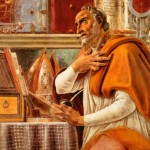Why Reality Includes More (Not Less) Than You May Think
by Dr. Peter Kreeft
Filed under Belief
The most usual position among philosophers in the Western world today, in fact the most usual position among academics generally, is some kind of reductionism. By “reductionism” I mean simply the belief that the world-view, or implicit metaphysics, of most people, or ordinary people, especially people of previous eras and cultures, errs by believing too much; that Hamlet’s Shakespeare was exactly wrong when he said to Horatio that “there are more things in heaven and earth than are dreamed of in your philosophy.” The prevailing view among modern Western intellectuals is that there are in fact fewer things, or fewer kinds of things, or fewer dimensions of things, in heaven and earth, that is, in objective reality, than in most people’s philosophies or beliefs. Thus most modern philosophers see the role of philosophical education primarily as a disillusioning, a debunking of myth, superstition, and naiveté.
This contrasts sharply with the way Plato and most classical philosophers saw the role of philosophy and the purpose of philosophical education. They saw it as a “leading-out” (that is the literal meaning of our word “education”: from the Latin e-ducare), leading the student out of a smaller, narrower belief-system that was like a little underground cave into a radically larger world. For Plato, this meant a world with more than the two metaphysical dimensions that most people believe exists: objective matter and subjective spirit or mind. It meant a third dimension, the dimension of objective Platonic Forms, objectively real Ideas that were not dependent on subjective minds.
Plato’s “cave,” the most famous image in the history of philosophy, and Plato’s “theory of Forms” or “theory of Ideas,” the most famous theory in the history of philosophy, exemplify the claim that Shakespeare was right. For they claim that there is not just another world, but another whole kind of world, another whole dimension of reality, which is neither subjective consciousness nor objective matter, but objective Form, essence, Idea, meaning, or “whatness.”
When Shakespeare had Hamlet utter his famous statement comparing the number of things in heaven and earth, that is, in objective reality, with the number of things in your philosophy, that is, in subjective consciousness, he probably did not have Plato’s theory of Forms in mind explicitly. Hamlet was simply telling Horatio that ghosts are real even though Horatio did not believe they were; that heaven and earth were more commodious than Horatio’s thoughts because they contained real ghosts. But what is common to both Plato and Shakespeare is the view that ordinary thinking errs not by believing too much to be real, but too little.
Certainly, most traditional philosophers, that is, most pre-modern philosophers, held this view. This is certainly true of Eastern philosophy, of Hindu, Buddhist, and Taoist philosophy. (We can call these religions “philosophies” insofar as they are examples of the human “love of wisdom,” though not primarily through the instrument of reason). It is true also of most pre-modern Jewish, Christian, and Muslim philosophers. But the modern tendency in the West is the opposite. It could be called “reductionism.” It seeks to reduce rather than to expand the student’s objects of belief. This tendency is already clearly present in Bacon, Machiavelli, Descartes, and Hobbes. In fact, it began with William of Ockham’s Nominalism, the denial of objectively real universals, which even in the 14th century was called the “via moderna,” the modern way.
I will label these two directions in philosophy “reductionism” and “transcendentalism,” just to have two handy, one-word terms. I mean by “transcendentalism” not the particular philosophy of Emerson and Thoreau but simply Shakespeare’s view that there is more, not less, in objective reality than we usually think.
It is usually thought today, by both reductionists and transcendentalists alike, that reason (in the modern sense of severely logical reasoning rather than in the older sense of the word “reason” that included intuitive or contemplative wisdom) leads to reductionism, and that the only way to justify transcendentalism is to reduce reason to a secondary or instrumental status and to exalt something else over it—for instance, intuition, desire, imagination or religious faith. The purpose of this article is to refute that idea by demonstrating, by strictly logical reasoning, (1) that reductionism is self-contradictory, and (2) that transcendentalism is self-evident once we admit data from our three most valued and distinctively human powers, namely our power to think anything true, to choose anything good, and to appreciate anything beautiful.
Today we'll focus on (1) and in the next article, later this week, we'll focus on (2).
Narrowing the Definition
We must first define transcendentalism more carefully. For in one sense, transcendentalism is obviously and non-controversially true: there are a larger number of entities in the world than we know about, more than any one individual human being and even all human beings, are aware of: more galaxies, more bacteria, more craters on the moon, more species of insects, etc. But that is merely quantitative. What is controversial is qualitative transcendentalism, which claims not merely that there are more things but more kinds of things than we think, more dimensions; that there are, in addition to rocks and dogs and stars, also things like gods or God, ghosts or angels, Platonic Ideas or Hegelian dialectical triads, attributes of Brahman or of Allah, and after-death experiences of reincarnations on earth or levels of Heaven and Hell. I do not claim to demonstrate the truth of any one of these particular versions of transcendentalism, but simply to demonstrate transcendentalism in principle.
Other meanings of “transcendence” are either too broad or too narrow for our purposes here. The term is too broad if it means simply any kind of moreness, for no one denies the purely quantitative moreness I mentioned above. Also no one denies the literal, physical transcendence of a flying airplane over the ground, or of a tall person over a short one, or the quantitative transcendence of the number 4 over the number 3, or of the amount of territory in the United States in the 21st century over the amount of territory in the United States in the 18th century, or the psychological transcendence of an act of disobedience to a law over the intention of the lawmaker to limit such acts. I want to use the term more narrowly and controversially than that.
On the other hand, “transcendence” is often used in a specifically theistic sense, as asserting a transcendent Creator-God. This is only one case in point of what I mean by “transcendence,” though probably the most important one. But I want to include also things like Plato’s “Ideas,” Plotinus’s “One beyond being,” Buddha’s “Nirvana,” Spinoza’s “natura naturans,” and even Shankara’s nondualistic notion of Brahman, which is monistic or pantheistic or pan-entheistic and thus not transcendent in the theistic sense. What all of these have in common is the claim that there are more kinds of things in reality than we ordinarily believe.
The Refutation of Reductionism in General
I will first refute reductionism in general, then three of the most important forms of reductionism in particular, namely the reduction of thought to something material, of moral choice to something relative, and of aesthetic experience to something subjective. Metaphysical materialism, moral relativism, and aesthetic subjectivism are three of the most popular forms of relativism, among ordinary people as well as philosophers. And they are all logically refutable.
Here is my logical refutation of reductionism.
The formula for reductionism is that “S is nothing more than P”, or “S is only P,” or “there is no more in S than P.” For instance, we may say “He’s nothing but a fake,” denying that he is authentic, or trustable, or truth-telling. Or we may say “that monster was nothing but a dream,” denying that it exists outside the dream. Or we may say that “love is nothing but lust” or “thinking is nothing but cerebral biochemistry,” or “evolution is nothing but the survival of the fittest” or “religion is nothing but superstition.” My argument here is not with the content but with the logical form of these assertions, so my point applies to all assertions that have this logical form, no matter what their content.
“S is nothing but P” means “there is nothing more in S than there is in P.” This, in turn, means that “there is no more-than-P S,” or “there is no trans-P S,” or “S does not transcend P.” For instance, “love is nothing but lust” means “there is no more-than-lust love,” or “there is no love that transcends lust.” Thus the formula for reductionism can always be expressed as an E proposition, a universal negative.
But there is a well-known difficulty in justifying universal negative propositions. To say that “there is no S that transcends P” means that “there is in all reality no S that transcends P.” For instance, to say that there is no real Santa Claus is to say that there is no real Santa Claus anywhere in the world, either at the North Pole or at the equator or in your closet.
Let us define Santa literally, as the entity in the popular story, the fat man in the red flannel suit who lives near the North Pole, employs elves to make toys, and flies magical reindeer through the skies to deliver presents to children around the world every Christmas. Even asserting skepticism about the existence of this literal Santa Claus has a logical difficulty. It is this: to claim that there is no Santa Claus is to claim that you know that there is no Santa Claus; and that is to claim that you know this universal negative, that you know that there is no Santa Claus anywhere in objective reality, as distinct from subjective reality, or consciousness, or imagination, or belief.
The difficulty is that in order to know that a proposition of this kind is true, we would have to know all of objective reality. For if we do not, then we cannot be sure that the thing we have denied existence to might not exist in some corner, or dimension, or part, or area, of objective reality that we did not know about.
The difficulty can be overcome, however, and the assertion that there is no Santa can be reasonably verified. For it does not require a universal knowledge of every particular, only of some empirical facts. For instance, we do not need to search every closet to be sure there is no Santa. For Santa, as defined, lives and works at the North Pole, and we have mapped all the regions around the North Pole and are quite sure that there are no factories there capable of producing enough toys for all the world’s children. Also, the laws of physics prevent anyone, even if he had magic flying reindeer, from flying to every child’s house in the world and depositing Christmas presents in one night.
(By the way, I do not think that magic flying reindeer are refuted in the same way by the laws of empirical physics, any more than any other kind of magic is. It is not logically impossible that some entities perform acts which defy physical laws, if those entities are not merely physical entities. We ourselves defy gravity whenever we decide to jump, because while we live we are not merely physical entities, but have souls or minds or wills, which interfere with matter, as a hand interferes with a sword’s tendency to fall whenever that hand swings the sword. But when we die, we (or what is left of us in this world) become merely physical entities. That is what we bury in cemeteries. And what we bury in cemeteries never jumps around and defies physical laws, just as a sword always drops to the ground and stays there when no longer wielded by a hand.)
Now let us substitute God for Santa Claus. (According to atheism, that is exactly what we do when we grow up.) God is not the only example of transcendence, but He is clearly the one most important, most interesting, and most argued about. So let us analyze what we are saying when we say “there is no God.”
Let us define or describe God as most people do, as “the being that created the universe.” Thus God by definition transcends the universe. So when we say that there is no God we are saying that there is in all reality no being that transcends the universe, that there is nothing more in reality than there is in the universe.
Now in order for us to know that there is nothing more in all reality than there is in the universe, we have to know something about all reality—in fact, we have to know enough about it to be sure that it excludes God. And if the idea of God is neither logically self-contradictory nor refuted by any empirical fact, then in order to justify the assertion that there is no God, we must know that there is no corner of reality, no kind of reality, and no dimension of reality, in which God can possibly exist. And that means that we have to know every corner, every kind, and every dimension of reality.
The word for that kind of knowledge is “omniscience.” It is an attribute of God. If there is an omniscient being, that being is God. So the claim that we can know that there is no God logically implies that the person who makes that claim has omniscience, that is, is God. So to claim to know that there is no God is to imply that there is a God, and that he is now speaking.
But just because reductionism is logically problematic, that doesn't mean transcendentalism is true. So on Friday I will offer a proof for transcendentalism. Stay tuned!
Related Posts
Note: Our goal is to cultivate serious and respectful dialogue. While it's OK to disagree—even encouraged!—any snarky, offensive, or off-topic comments will be deleted. Before commenting please read the Commenting Rules and Tips. If you're having trouble commenting, read the Commenting Instructions.













